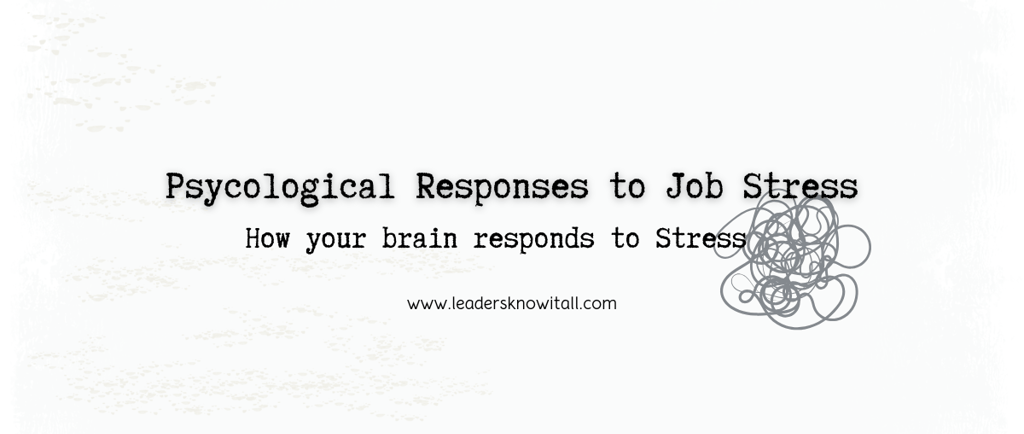Psycological Responses of Job Stress
In the present world of rush and pressure there is stress everywhere. One very common and regular source of our stress is our workplace. Job stress or Workplace stress is very common these days. In this article we will cover the different psychological responses that our body shows in case of stress.
JOB STRESSPSYCOLOGICAL STRESSPSYCOLOGICAL RESAPONSE TO JOB STRESSTOXIC WORK CULTUREWORKPLACEWORK STRESS
Leaders Know It All
6/7/20255 min read


How Your Brain Responds to Stress: A Deep Dive into the Mental Maze
We all experience stress—whether it’s from work, relationships, money issues, or just the chaos of everyday life. While it's easy to spot the physical signs of stress (like headaches, tense muscles, or trouble sleeping), what often goes unnoticed are the psychological responses happening behind the scenes in your brain.
These hidden mental responses can be just as powerful—and sometimes more disruptive—than the physical ones. So, let’s pull back the curtain and explore what really goes on in your mind when stress hits. Spoiler alert: it's more than just feeling overwhelmed.
1. The Basics: Fight or Flight... or Freeze or Flee
When you're stressed, your brain goes into survival mode. The classic "fight or flight" response is well-known, but it’s just part of the story. You might also "freeze" (feeling stuck or paralyzed) or "flee" emotionally—disconnecting from the situation altogether.
This response is deeply wired into your brain's amygdala, the part that controls emotions and fear. It’s trying to protect you, but sometimes, it goes into overdrive, reacting to a nasty email as if it were a saber-toothed tiger.
2. Emotional Reactions (Affective Responses)
Let’s start with the emotional side of stress—what psychologists call affective responses. These are the feelings and moods that come up when your brain senses stress.
• Apathy, Boredom, and Resignation
Ever find yourself saying “What’s the point?” or feeling indifferent even when you know you should care? That’s stress draining your emotional energy. This emotional numbness, or apathy, is your brain's way of coping with overload.
Resignation is when you stop trying altogether. You give up because it feels like nothing you do matters. It’s like your brain throws in the towel to conserve resources.
Boredom might seem unrelated to stress, but chronic stress can make even interesting things feel dull. It's not that life suddenly got boring—your brain just isn't fully engaged anymore.
• Irritability and Low Tolerance for Ambiguity
When your stress levels are high, even small things can set you off. You might snap at people, feel frustrated over nothing, or get annoyed when plans change. That’s irritability, and it’s your brain's alarm system blaring non-stop.
Stress also shrinks your tolerance for uncertainty. You want clear answers and quick solutions, and anything vague can feel deeply unsettling.
• Negativism and Feelings of Persecution
Stress can make you see the world through a negative lens. Everything feels worse than it is, and you may begin to assume the worst in people. You might even start to feel like others are out to get you, which psychologists call persecutory feelings. It’s not necessarily paranoia—it’s your brain being hyper-vigilant, trying to spot danger before it happens.
3. Mental and Thinking Patterns (Cognitive Responses)
Stress also messes with how you think. These cognitive responses can creep in slowly and make life harder than it needs to be.
• Forgetfulness and Inattentiveness
How many times have you lost your keys when you're stressed? Or forgotten an appointment? Stress clutters your mental workspace, making it hard to remember even basic stuff.
Your concentration takes a hit too. You might find yourself rereading the same email ten times or zoning out during conversations. That’s stress interrupting your brain’s ability to focus.
• Inner Confusion and Unclear Roles
Stress creates mental fog. You might feel unsure about your purpose, your goals, or even your daily tasks. “What am I supposed to be doing right now?” becomes a frequent internal question. If your roles in life (parent, partner, employee) start to feel blurry or overwhelming, stress is likely the culprit.
• Poor Judgment and Trust Issues
When under stress, your ability to judge character or situations takes a dive. You might misread people’s intentions, get paranoid, or make hasty decisions. It’s not because you’ve become a bad judge overnight—your brain just isn’t firing on all cylinders.
You may also become uncertain about whom to trust, even doubting people you’ve relied on for years. Stress rewires your brain to expect betrayal or disappointment.
• Tunnel Vision and Decision-Making Struggles
Stress often leads to tunnel vision—a narrow focus where you miss the big picture. You become so fixated on one issue that you can’t see other possibilities or solutions. It’s like trying to navigate a maze with blinders on.
This makes decision-making tough. You might flip-flop between choices or freeze up altogether. This vacillation isn’t a personality flaw; it’s your stressed brain struggling to weigh options clearly.
4. Defense Mechanisms: The Brain's Weird Coping Tricks
When stress feels overwhelming, your brain starts reaching for psychological defense mechanisms. These are like mental shortcuts designed to protect you—but they can backfire.
• Regression
You might notice yourself acting more immature than usual—maybe throwing a mini tantrum or craving childhood comforts. That’s regression—a return to earlier, safer stages of behavior.
• Fixation
Your brain might get stuck on one thought, idea, or solution—refusing to adapt or move on. This fixation is like your mind putting all its chips on one number in a mental roulette game.
• Projection
This is when you take your own feelings (especially negative ones) and attribute them to others. If you're feeling insecure, you might start thinking others are judging you, even if they’re not.
• Fantasy
If real life feels too overwhelming, your brain might start retreating into fantasy. You daydream about quitting your job, running away, or becoming famous—not just for fun, but as an emotional escape.
5. Procrastination and Perfectionism
Sometimes when you're stressed, you delay doing things—not because you’re lazy, but because you’re overwhelmed. This is procrastination at its root: avoidance caused by fear of failure or mental overload.
On the flip side, some people become perfectionists when stressed. They try to control every detail, obsess over mistakes, and spend hours on tasks that normally take minutes. It’s a way to create order when everything feels chaotic.
6. Gut Feelings and Unexplained Dissatisfaction
Have you ever just felt off without knowing why? That gut feeling—something’s wrong but you can’t put your finger on it—is often a stress response.
Your brain and gut are tightly connected (via the gut-brain axis), and chronic stress can stir up weird stomach sensations, unexplained dissatisfaction, and a deep sense that things just aren’t right.
7. Putting It All Together: The Beehr & Newman Framework
Researchers Beehr & Newman (1978) grouped stress responses into three main categories:
Affective (emotional): Irritability, anxiety, sadness, boredom, apathy.
Cognitive (mental): Forgetfulness, poor concentration, distrust, indecision.
Behavioral (actions): Withdrawal, procrastination, fixation, regression.
Understanding that your stress reactions fall into these patterns can help you recognize them sooner—and take action before things spiral.
Final Thoughts: You're Not Broken—You're Just Human
Stress is universal. The way your brain responds to it may feel chaotic, but it’s actually trying to protect you. It’s like an overenthusiastic bodyguard who means well but sometimes tackles the wrong person.
The key is to recognize your own stress signature—those telltale signs that your brain is waving the red flag. Maybe it’s irritability. Maybe it’s forgetting everything. Maybe it’s daydreaming too much or being paralyzed by decisions.
Once you know your patterns, you can manage them better. Deep breaths, therapy, journaling, boundaries, saying “no,” more sleep—these aren’t luxury moves. They’re survival strategies for a stressed-out brain.
So next time you’re spiraling into confusion, fatigue, or apathy, don’t beat yourself up. Your brain’s doing its best. And now, so can you.
Need help figuring out your stress type or want tips to manage it better? Drop your questions below—we’re all in this together. 💬🧠✨
Love and Light
LKIA
